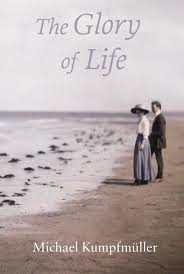Not many writers inspire an adjective: Dickens, of course, Rabelais, and, above all, Kafka. This intimidating legacy has not encouraged other writers to leave well alone; from Alan Bennett to Haruki Murakami, the Kafka legend has been plundered and parodied, and now German author Michael Kumpfmuller (a name unlikely to be extended to descriptive use) has chosen to fictionalise the last year of his life in the novel The Glory of Life. Fourteen years ago Kumpfmuller published the comedic Adventures of a Bed Salesman, also translated by Anthea Bell into English. Two novels since have failed to attract the attention of UK or US publishers, and it can probably be assumed that the Kafka connection (and Haus Publishing’s focus on literature in translation) helped this fourth novel get noticed.
The Glory of Life takes as its starting point the meeting between Kafka and Dora Diamant in July 1923 in Graal-Muritz on the Baltic Sea where Kafka was holidaying and Dora was working as a cook at a home for Jewish children. Dora was the last in a line of young women (of course they started when Kafka was young, but by now he was forty while Dora was twenty-five) including the Felice and Milena now immortalised in Letters to… The correspondence to Dora has been lost allowing Kumpfmuller more artistic licence. Kumpfmuller presents the story from both Dora and Kafka’s point of view. Here, for example, is their first meeting:
“She tells him in far too much of a rush: I saw you on the on the beach with your wife – although she knows it can’t have been his wife or why has she felt so light-headed since he came to stand close to her in the kitchen? … I’d like to see you again, he says…She feels like calling her reply out loud: as soon as you wake up, whenever you like.”
The attraction is instant and all-consuming. It is also reciprocated, as we can see in the echo of Dora’s thoughts in Kafka’s own:
“…he knows at once in the morning that she is there somewhere, as if there were a rope between him and her, and they are slowly working their way along it towards each other.”
Soon they are planning their life together in Berlin, where they do eventually spend many happy months together despite food shortages and rampant inflation. (While they are far from wealthy, they are never quiet poor, and the sources of their income remains something of a mystery). Kafka had been diagnosed with tuberculosis in 19717, and his condition had to be carefully managed, eventually deteriorating to the point he has to be readmitted to a sanatorium. The novel ends with his death in 1924 (as a factual event, this can hardly be termed a spoiler).
The Glory of Life is a touching love story, with Dora’s devotion to Kafka often affecting. At this point in his life Kafka was writing short stories, including ‘The Hunger Artist’ (ironically weeks prior to his death from starvation). His writing is mentioned frequently, yet the novel sheds little light on it. It is an activity he undertakes as opposed to an intellectual process that is revealed to us. Of course, that may not be Kumpfmuller’s concern, but then why chose a writer as your central character if his writing does not interest you?
For this reason, Kafka often comes over as a rather bland character. There is little conflict in his life, particularly in his relationship with Dora. She, and his sister, Ottla, seem to go out of their way to please him. Despite his gloomy reputation, in this novel he seems mostly happy, even as death approaches: “he feels surprisingly well”; “a new calm mood sets in”; “he is in a cheerful mood until evening.” He considers Dora’ future after his death but decides “she will be all right.”
I enjoyed The Glory of Life and its recreation of Kafka’s final year. Kumpfmuller’s attention to setting is a particularly interesting – though Kafka is in some ways remote from ordinary life, the novel also shows him immersed in it. My misgivings lie in the novel’s inability to give us much insight into Kafka the writer – and also in the irony that he has somehow become trapped in a rather conventional novel.
Thanks to Lizzy at Lizzy’s Literary Life for my copy of The Glory of Life.
Tags: german literature month, glory of life, michael kumpfmuller

November 10, 2014 at 4:05 pm |
I’m reading this right now. As soon as I’ve finished it, I’ll read your review.
November 10, 2014 at 8:25 pm |
I look forward to hearing your views.
November 12, 2014 at 12:53 pm |
Haven’t read this one yet but I remember the reviews in Germany were quite enthusiastic. The ultimate read about Kafka as a writer though is Reiner Stach’s brilliant biography (now complete after the third volume is in print).
November 12, 2014 at 8:49 pm |
I notice that’s available in English. I don’t read a lot of biography, even of writers, but in Kafka’s case I might make an exception.